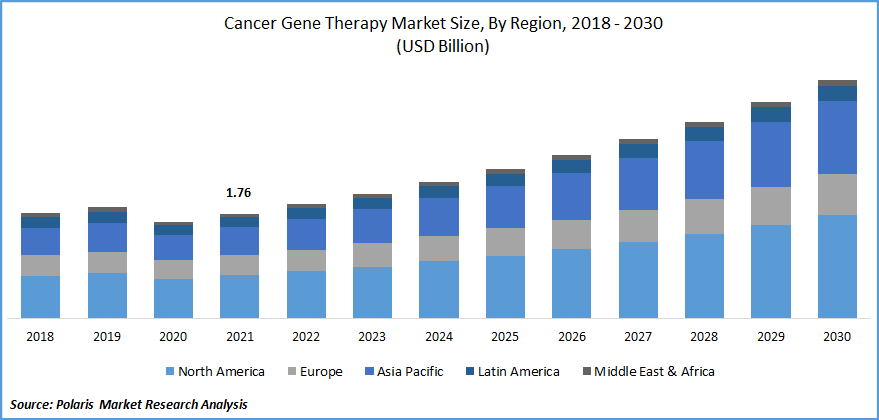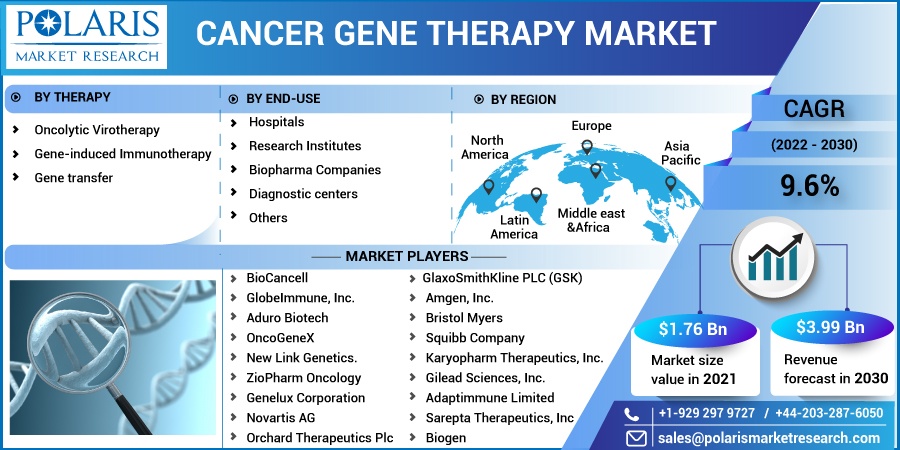
Cancer Gene Therapy Market Share, Size, Trends, Industry Analysis Report, By Therapy (Oncolytic Virotherapy, Gene Transfer); By End-Use (Research Institutes, Biopharma Companies); By Region; Segment Forecast, 2022 - 2030
- Published Date:Sep-2022
- Pages: 112
- Format: PDF
- Report ID: PM2588
- Base Year: 2021
- Historical Data: 2018-2020
Report Outlook
The global cancer gene therapy market was valued at USD 1.76 billion in 2021 and is expected to grow at a CAGR of 9.6% during the forecast period. The demand for the industry is expected to expand during the forecast period owing to the increasing prevalence of cancer. Cancer is considered to be the second largest cause of death, according to the World Health Organization (WHO).

Know more about this report: Request for sample pages
The industry gained popularity with highly successful results in its clinical and preclinical trials. With the increased investment in R&D, rising demand for DNA-based therapeutics, and acceptable gene therapy, the growth of the cancer gene therapy market will increase over the forecast period.
The cancer gene therapy market was negatively impacted during the COVID-19 pandemic. The treatment of the disease witnessed a decline in demand during the pandemic owing to the rising cases of COVID-19. The diagnosis of diseases was suspended amid the pandemic as people were afraid to visit hospitals. Many hospitals and clinics were completely utilized by COVID-19 treatments. However, after the pandemic, the market is expected to grow during the forecast period.
As this treatment is preclinically and clinically getting high success rates, the demand for treatment is increasing in many countries, such as India, China, the U.S., and many others. With the increasing number of cancer cases, advancements are made in molecular biology, virology, and immunology. With the advanced infrastructure, healthcare advancement, and rising R&D investment, the industry is expected to grow in the future.
 Know more about this report: Request for sample pages
Know more about this report: Request for sample pages
Industry Dynamics
Growth Drivers
The increasing prevalence of cancer is the primary key driver for the growth of the industry. It is considered to be the second largest death cause in the world. Many factors can cause cancer, but the key five factors are tobacco use, alcohol consumption, low physical activity, high body mass index (BMI), and low intake of fruits and vegetables.
The regulatory environment is improving; thus, the industry will expand during the forecast period. The treatment is directly connected to consumer health; hence the quality of the product, i.e., vectors, cannot be compromised. Many laws and regulations are made for the production of vectors (products), as well as post-marketing. Thus, a single flaw is not found, as a single defect can be disastrous to patient health. Thus, with the availability of high-quality vectors (product), the industry will expand.
The rising R&D investment, technology advancement, and advanced infrastructure are the major drivers for the growth of the cancer gene therapy market. Government organizations are focusing on better healthcare infrastructure with higher investment.
The cancer gene therapy market is expected to grow as major key players are launching new products with better success rates and are emerging in a massive untapped market, thus opening more opportunities. Many new innovative therapies are available for cancer treatment that are ethically acceptable, thus contributing to the industry’s growth.
Report Segmentation
The market is primarily segmented based on therapy, end-use, and region.
|
By Therapy |
By End-Use |
By Region |
|
|
|
Know more about this report: Request for sample pages
Gene-induced Immunotherapy segment dominates the market 2021
In therapy type, gene-induced immunotherapy dominates the market owing to the rising investment in R&D and advancements in gene technology. In gene-induced immunotherapy, genes are induced in the body, which are pieces of DNA to immune the body with healthy genes; it can be done in various ways.
The genes are induced to kill the cancer cells and stop their growth in the body; some of the methods are ACT, CAR-T, TCR, TIL, and many more. With the higher government organization investment in R&D, the segment is anticipated to dominate the industry over the forecast period.
Hospitals are expected to spearhead the market growth
The demand for the industry is higher in hospitals, contributing to the growth of the global market, and is anticipated to grow during the forecast period owing to the increasing prevalence of cancer. With the higher increase in the geriatric population around the globe, diseases are spreading, thus increasing the prevalence of cancer.
The advancement in healthcare infrastructure is one of the reasons for the growth as hospitals provide every treatment under one roof, thus contributing to the growth. Research institutes and diagnostics centers also contribute to the development of the end-user segment.
Asia Pacific is expected to witness fastest growth over the forecast period
North America dominates the market with the highest revenue share in 2021 and is anticipated to grow at a significant CAGR during the forecast period owing to technological advancements as well as the rising investment in R&D. Many major key players of the market are present in North America, bringing new advancements and technology. The well-established healthcare infrastructure is one of the reasons North America dominates the industry.
Asia Pacific is anticipated to grow at higher CARG during the forecast period. The increasing geriatric population can be one of the reasons for the growth. Increasing government investment and initiatives in healthcare with advancements in technology contributes to the growth of the industry.
Competitive Insight
Some of the major players operating in the global market include Altor Bioscience Corporation, SiBiono., Shanghai Sunway Biotech Company Limited, BioCancell, GlobeImmune, Inc., Aduro Biotech, OncoGeneX, New Link Genetics., ZioPharm Oncology, Genelux Corporation, Novartis AG, GlaxoSmithKline PLC (GSK), Amgen, Inc., Bristol Myers, Squibb Company, Karyopharm Therapeutics, Inc., Gilead Sciences, Inc., Adaptimmune Limited, Sarepta Therapeutics, Inc, Biogen, Orchard Therapeutics Plc, Spark Therapeutics, Inc., AGC Biologics, Anges, Inc., Bluebird Bio, Inc., Jazz Pharmaceuticals Inc., Dynavax Technologies, Human Stem Cells Institute, Uniqure N.V., Gensight Biologics, Celgene Corporation, Cellectis, Merck KGaA, AstraZeneca Plc., BIOCAD, Crinetics Pharmaceuticals, Inc., EffRx Pharmaceuticals S.A., Euroscreen S.A., Vicore Pharma AB, Cell Genesys Inc., Achieve Life Science Inc., Advantagene Inc., GenVec Inc.
Recent Developments
September 2022: GlaxoSmithKline (GSK) gave a presentation on the role of Zejula and Jemperli and how they are used to treat particular cancer at ESMO as well as Gsk and iTeos are planning to start the study with the dostarlimab that recently got approved as a cancer drug.
June 2022: ImmunoAct completed its phase 1 clinical trials of CAR-T (chimeric antigen receptor) treatment that is used for the treatment of certain types of cancer and it will cost one tenth price of the treatment in India.
August 2022: Bristol Myers Squibb completed the acquisition of Turning Point Therapeutics, which works on oncology, and this acquisition will strengthen the oncology market.
March 2021: Bristol Myers Squibb and Bluebird Bio received approval from FDA for cell-based therapy known as Abecma, also working on an Opdivo-based combination for cancer treatment.
April 2024: India introduced its first natively developed chimeric antigen receptor (CAR) T-cell therapy, actalycabtagene autoleucel. Tata Memorial Hospital and Indian Institute of Technology, Bombay had joined forces with industry partner ImmunoACT for the development of the therapy.
June 2024: FDA granted accelerated approval to adagrasib plus cetuximab for adults with KRAS G12C-mutated colorectal cancer. Patients who have received prior treatment with oxaliplatin-, fluoropyrimidine-, and irinotecan-based chemotherapy, as determined by an FDA-approved test, are eligible for it.
Cancer Gene Therapy Market Report Scope
|
Report Attributes |
Details |
|
Market size value in 2021 |
USD 1.76 billion |
|
Revenue forecast in 2030 |
USD 3.99 billion |
|
CAGR |
9.6% from 2022 - 2030 |
|
Base year |
2021 |
|
Historical data |
2018 - 2020 |
|
Forecast period |
2022 - 2030 |
|
Quantitative units |
Revenue in USD billion and CAGR from 2022 to 2030 |
|
Segments covered |
By Therapy, By End-Use, By Region |
|
Regional scope |
North America, Europe, Asia Pacific, Latin America; Middle East & Africa |
|
Key companies |
BioCancell, GlobeImmune, Inc., Aduro Biotech, OncoGeneX, New Link Genetics., ZioPharm Oncology, Genelux Corporation, Novartis AG, GlaxoSmithKline PLC (GSK), Amgen, Inc., Bristol Myers, Squibb Company, Karyopharm Therapeutics, Inc., Gilead Sciences, Inc., Adaptimmune Limited, Sarepta Therapeutics, Inc, Biogen, Orchard Therapeutics Plc |
